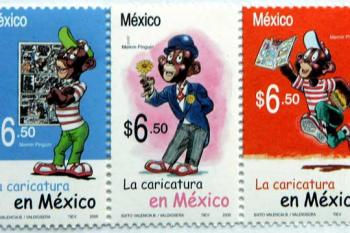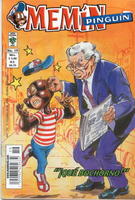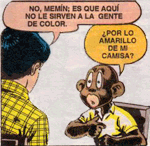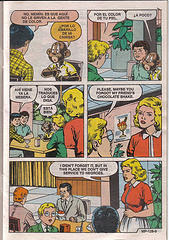 The 1940's creation of famed Mexican writer, Yolanda Vargas Dulché and comic book illustrator, Alberto Cabrera, Memín Pinguín was an unlikely candidate at the time to spark a 21st century international debate on racism in Mexico and the United States. But when the Mexican post office decided to release a commemorative series of stamps honoring the comic character, the White House condemned the decision and spokesman Scott McClellan responded with the following:
The 1940's creation of famed Mexican writer, Yolanda Vargas Dulché and comic book illustrator, Alberto Cabrera, Memín Pinguín was an unlikely candidate at the time to spark a 21st century international debate on racism in Mexico and the United States. But when the Mexican post office decided to release a commemorative series of stamps honoring the comic character, the White House condemned the decision and spokesman Scott McClellan responded with the following:
“Racial stereotypes are offensive, and I would say racial stereotypes are offensive no matter what their origin. The Mexican government needs to take this into account. Images such as these have no place in today's world.”
Eight days later and the blogosphere in both Mexico and the United States has become saturated with opinions about both the Mexican post office's decision to release the stamps as well as the U.S. government's reaction to the decision.
 Latino blogger, ngrand78, writing from Tucson, Arizona, was one of the first to post about the issue explaining that he agrees “that Memin Pinguin has exaggerated features thick lips and wide-open eyes. But what people have to take in consideration is that the Mexican culture is different, I am not going to say that discrimination doesn't exist in Mexico, it's just based in other characteristics, social status and wealth being the most notable ones. The truth is that back there the color of the skin is not important and people pay little attention.” ngrand78 has generated a tremendous amount of comments and, like many bloggers writing on the subject, has updated his post to clarify his thoughts.
Latino blogger, ngrand78, writing from Tucson, Arizona, was one of the first to post about the issue explaining that he agrees “that Memin Pinguin has exaggerated features thick lips and wide-open eyes. But what people have to take in consideration is that the Mexican culture is different, I am not going to say that discrimination doesn't exist in Mexico, it's just based in other characteristics, social status and wealth being the most notable ones. The truth is that back there the color of the skin is not important and people pay little attention.” ngrand78 has generated a tremendous amount of comments and, like many bloggers writing on the subject, has updated his post to clarify his thoughts.
Mark in Mexico, writing from Puebla, concurs that culture is at play:
By our standards, it is blatatantly rascist. By Mexican standards it is not. Mexican society is a rascist society kind of like that of Japan. Intermarriage, even fraternization, between the mestizos and the indigenous peoples is frowned upon and is rare. Even more rare is intermariage or fraternization with blacks. By mestizos I mean the lighter complected Mexicans of mixed Spanish/Indian or European/Indian descent. In Mexico, the whiter your skin the better. Mexican mestizos see nothing wrong with this and do not consider it rascist at all.
His post has a thorough collection of Memín Pinguín images and links to other blogs discussing the controversy.
Mexican-American blogger, Gustavo Rojo however disagrees:
My problem with the Memin Penguin stamp controversy is that in Mexico it should be a controversy but it is not. Just because Mexico didn’t have a “slavery issue” doesn’t mean that racism hasn’t been a problem. Race has always been a problem in Mexico from its inception.
After reading a post by Blex though, Gustavo updates his own and asks, “Is it so wrong to make fun of one another. It’s not like the mission behind this comic is to spread hate or some other propaganda. It is genuinely good-hearted.”
Michelle's Pink Place seems to disagree. Linking to two posts explaining the cultural differences regarding race in Mexico and the U.S., she points out:
Yes, people perceive race differetly in different countries. I can't speak for how black Mexicans would feel. How about the revolutionary idea that, for those of us here in the US, the stamps represent a racist or racially-charged image, not because anyone says they are wrong, but just because they are?
 Grammar.police makes the point that, “it doesn't necessarily follow that Mexico should share this collective shame related to blackface comedy. When complex cultural symbols are imported from one society to another their component antecedents are often lost in translation. (Think of, say, the Christmas tree.) I don't know when blackface comedy arrived in Mexico or how the symbol operates there, honestly, but I imagine it has been stripped it of its original context, which wouldn't have had much meaning for a nation that has a very marginal and localized population of people of African descent and never experienced the tragedies of African American history.”
Grammar.police makes the point that, “it doesn't necessarily follow that Mexico should share this collective shame related to blackface comedy. When complex cultural symbols are imported from one society to another their component antecedents are often lost in translation. (Think of, say, the Christmas tree.) I don't know when blackface comedy arrived in Mexico or how the symbol operates there, honestly, but I imagine it has been stripped it of its original context, which wouldn't have had much meaning for a nation that has a very marginal and localized population of people of African descent and never experienced the tragedies of African American history.”
Negrophile (from whom I stole the title of this post) links to a San Francisco Chronicle article by history professor, Myrna Santiago who, not surprisingly, says the controversy stems from a difference in history between the two nations.
Like Planeta Grenada, Lost Budgie also puts the discussion into a historical frame, but says this time, “Fred and Mexico have it wrong.” DJ Bloodsock agrees:
Now, I’ll grant you that Mexico does not have the same concept of race as we have in the States, arguably due to a significantly different history of race relations. But still, it is naive at best to think that people who identify themselves as Black (or African-American; pick your label) would not be offended by a gross caricature that is more simian than sapien.
 Latina Lista says that although American prejudices continue, “it is obvious Mexico is at the stage where America was over 100 years ago when people thought there was nothing wrong in keeping other people as property or selling them like cattle, regardless if they were separating mothers from their children.” And Moonbat Central questions if Reverand Jesse “Jackson is guilty of ‘American cultural imperialism'???”
Latina Lista says that although American prejudices continue, “it is obvious Mexico is at the stage where America was over 100 years ago when people thought there was nothing wrong in keeping other people as property or selling them like cattle, regardless if they were separating mothers from their children.” And Moonbat Central questions if Reverand Jesse “Jackson is guilty of ‘American cultural imperialism'???”
Webadedios, writing from Mexico, on the other hand, says you can sum it all up to “Gringo paranoia” [es] and that Memin Pinguin is not about race, but rather making people laugh. So agrees Isopixel who recommends that Americans should take a closer look at history [es]. Vidablog, also writing from Mexico, asks [es] “who is the United States to ‘stick its spoon’ into the internal affairs of Mexico?”
The Shǐt’ē Place, written from Monterrey, Mexico says Americans and Mexicans interpret race differently and leaves a list of open-ended questions to “be answered in time.”
African-American blogger, Joy-Ann Reid agrees that a cultural relativist perspective needs to be taken. But she doesn't see the issue going away any time soon:
The bottom line is, the Mexican cartoon isn't seen as racist by Mexicans, and that type of depiction of Blacks is, I would say, fairly uncontroversial in Latin American entertainment. That doesn't sit well with African-Americans, and the Jesse Jacksons of the world may even be able to make enough noise to force the stamps back into the desk drawer, but the cultural issue won't go away so easily.
We'll probably be able to judge by the latest going eBay bid.
In the end, it is probably history professor Myrna Santiago who best sums up the debate:
Thus, rather than condemning Mexico for issuing Memín Pingüín stamps, the federal government and U.S. citizens would be better off encouraging a cross- border conversation about race in all its complexities. Such a conversation might then inspire youth on both sides of the border to ask the questions I never asked, not only about the history of people of African descent in Mexico, but also about the root causes of racism, discrimination and inequality in both nations. Surely, that is a concern people across both countries share — and the reason why we all care about Memín Pingüín.
Update: Venezuelan reader Iria Puyosa points us to Mexican blogger, Alberto Chimal's excellent post on Racismo [es] and writes:
The post provides details on the comic four masin
characters (a black poor kid, a neglected kid who is the best student
in the school, a rude kid whose mother works in a cabaret, and wealthy
kid who is sent to a public school to teach him about the real world).Maybe, what is needed is to send U.S. officers and Mexican
Presindent also to a Mexican public school. They may learn about the
real world, then stop talking nonsense, and start working.







16 comments
Well, this has certainly been an issue that leaves people on both sides of it a bit perplexed. The reaction of the black community is also diversified but I think that, if there was anyone that we should get mad at, we should get mad at the American politicians. Having much other stuff to worry about, they played the ‘sensitivity on pseudo-racism’ card on the issue… evidently because a few weeks before Vicente Fox had not apologized publically. He just ‘cleared things up’.
I would hope that our american neighbors remember that a sample of one man for a population of 104 million should not be taken into account as a good representation of the whole community.
That is why us mexicans won’t think that americans always choke on pretzels, or forget famous frases (fool me once, shame on… derrrrr), or can’t pronounce nuclear.
Analogically, americans won’t think that all mexicans wear sombreros and eat at taco bells…
So, what I’m trying to say is that you shouldn’t take one man’s words and condemn a whole country for the ideas of our president, which clearly don’t represent how the majority of Mexico thinks about the USA and black people.
From my experience with Mexicans:
USans try as much as possible to minimize sex, power, class (and other) differences, but Mexicans like to emphasize them. Any distinctive physical feature of a person will be the focus of attention and conversation and if you’re get to know people, your distinctive feature (whether weight, height, skin color, large nose, whatever) will probably be the basis of an affectionate nickname.
There aren’t that many black people in Mexico so the perceived different features of Memín Pingüín are exaggerated (just as the perceived zaftig features of women of north european origin are usually exaggerated in Mexican comics).
I’ve read a very few Memín Pingüín comics and (after I got over the shock of his appearance) they didn’t strike me as racially based humor. He’s the very human protagonist (with a good heart) and not remotely meant as a symbol of anything but of imperfect (specifically Mexican) humanity. Yes, If I were black I can imagine I might react somewhat differently.
But mostly, I’m just amazed that people in the US think it’s their business what Mexicans put on their stamps.
This is what we came up with. It was kind of heard, becasue we had to unify the views from our american, mexican, and european team members. Check it out, I hope you like it..
http://www.mobuzztv.com/shows/170.html
I found a cartoon in a local paper (Tijuana, across the border from San Diego, California). The plot of the cartoon was to present a politically correct Memin Pinguin that would be accepted by our fellow americans. The result was an white boy. This is the thing, if the cartoon character was just a white boy with common white boy features it would not be considered racism by americans. It would have to be a white boy. Now, THAT’s racism.
On other aspect, for Mexican people, Memin Pinguin is more an archetype than a stereotype. An archetype that is based more on the images of black central-americans than the now-called african americans. Memin’s mother is a classic Mamá Iné and he himself is just a regular boy son on a Mamá Iné. An archetype, a basic Carl-Jung-like image from which some of our individual images part, not a stereotype that traps them.
Regarding Michael Ferris’ comment: he seems to grasp the sense of the mexican self better than some native mexicans. Good for ya.
Yes, physical features make for our nicknames, with no offense intended or taken. I still remember a popular TV show (Chispas de Chocolate, “Chocolate Chips”), broadcasted by then most important TV chain in Mexico, Televisa, and performed exclusively by black mexicans. Many of the gags were about the darkness of black people, but it was not ill-hearted. The show was popular, loved and widely reproduced in everyday activities by all sorts of people. Our internal history allows it.
The fuss should be made about native americans from Chiapas or Oaxaca, who live almost deprived from the goods of modern life. Oh, but those are so nice to see and framed in a vacation picture by our european and american visitors! (sarcasm intended, sorry).
God Bless America and God Bless Mexico truly at the end of the day the only thing that counts is what GOD sees in your heart.We need to pray and ask the LORD for Help!
no mamen, there is no such a thing as racisim in mexico……….but our “vecino” from the north……is about the only country in the world where it is very much alive. just like has alway has been.
no mamen, there is no such a thing as racisim in mexico……….but our “vecino” from the north……is about the only country in the world where it is very much alive. just like alway has been.
全球的声音
全球的声音 – “全球声音在线”(Global Voices Online)是哈佛大学法学院伯克曼中心设立的一个全球Blogger 互动的窗口,重新设计的网站昨天上线,采用了目前流行的三栏模式(虽然我不够喜欢太少的